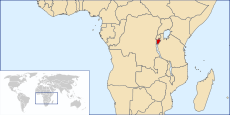United Nations Integrated Office in Burundi
| BINUB | |
|---|---|
| operation area | Burundi |
| German name | United Nations Integrated Office in Burundi |
| English name | United Nations Integrated Office in Burundi |
| French name | Bureau Intégré des Nations Unies au Burundi |
| Spanish name | Oficina Integrada de las Naciones Unidas en Burundi |
| Based on UN resolution | 1719 (October 25, 2006) |
| Type of mission | Peacebuilding |
| Beginning | January 1, 2007 |
| The End | December 31, 2010 |
| management | Youssef Mahmoud (Tunisia) |
| Location of the operational area |

|
The United Nations Integrated Office in Burundi ( French Bureau Intégré des Nations Unies au Burundi , BINUB ) was a United Nations (UN) mission to strengthen the national capacities of the Burundian government to overcome the consequences of the Burundian civil war. The mission took place directly after the United Nations Mission in Burundi (ONUB). Their mandate goes back to the UN Security Council Resolution 1719 , began on January 1, 2007 and was initially limited to December 31, 2007. The then acting Secretary General of the United Nations, Kofi Annan, appointed the Tunisian Youssef Mahmoud, born in 1947, to head the mission .
At the end of 2007 the mission was extended for a further two years and finally ended on December 31, 2010. The successor mission with a limited area of responsibility is the BNUB from January 1, 2011 , resolved by UN Security Council resolution 1959 .
background
For years, a civil war between the two ethnic groups of Hutu and Tutsi raged in Burundi , which has cost an estimated 250,000 lives since 1993 alone. During the worst of the crisis, around 1.3 million people were internally displaced or fled abroad. After there was a ceasefire agreement between the conflicting parties on September 7, 2006 with the support of the UN predecessor ONUB mission, it was decided to continue the previous predominantly military mission (ONUB) as a predominantly political mission (BINUB) from the beginning of 2007.
Mission duties
The most important task of the mission was to strengthen the Burundian government and civil society through reforms in the areas of politics and administration in order to remedy the causes of the past civil war and to manage and resolve existing internal conflicts. The means were more transparency and accountability of public institutions, the promotion of freedom of the press and development work in the media sector.
In doing so, the consolidation of the rule of law should be promoted and monitored through strengthening the judiciary and prison system , including the independence and capacity of the judiciary. Compliance with the ceasefire of 7 September 2006 in Dar es Salaam ( Tanzania ) should be monitored through disarmament, demobilization , reintegration of former combatants and reform of the security sector . The aim was to provide technical assistance for the implementation of the reform in the form of training measures for the Burundi National Police in the field of human rights and technical assistance to increase the professionalism of the National Defense Force.
A national action plan for human rights, which also includes the establishment of an independent national human rights commission , should also be helped to establish an institution for the rights of women, children and other vulnerable groups . Particular emphasis was placed on the establishment of a truth and reconciliation commission and a special court to combat impunity .
In addition, it was about supporting the Burundian government in cooperation with donors and the subsequent fight against poverty and the implementation of an emergency aid program as well as the coordination of the individual UN organizations and programs in Burundi.
Results
Five elections took place in Burundi between May and September 2010, all of which were successful and without major incidents. These included the presidential elections in Burundi 2010 , the parliamentary elections in Burundi in 2010 and the local elections in Burundi in 2010 .
In January 2011 BINUB was replaced by BNUB (Bureau des Nations Unies au Burundi), the mandate was initially valid until December 31, 2011.
Web links
- Official Website of the Mission (French)
- Wording of resolution 1719 on the mandate of the mission (German; PDF file; 46 kB)
- Overview of resolutions and missions of the UN which affect Burundi (German)
Individual evidence
- ↑ un.org: Secretary-General appoints Youssef Mahmoud of Tunisia as Deputy Special Representative for Burundi . September 22, 2006. (English)
- ↑ S-RES-1791 (2007) Security Council Resolution 1791 (2007) ( Memento of the original of May 22, 2011 in the Internet Archive ) Info: The archive link was automatically inserted and not yet checked. Please check the original and archive link according to the instructions and then remove this notice.
- ^ UN Security Council, Resolution 1858 ( Memento of October 12, 2013 in the Internet Archive ) December 22, 2008
- ^ UN Security Council, Resolution 1902 ( Memento of October 19, 2014 in the Internet Archive ) December 17, 2009
- ^ UN Security Council, Resolution 1959 ( Memento of July 22, 2013 in the Internet Archive ) December 16, 2010
